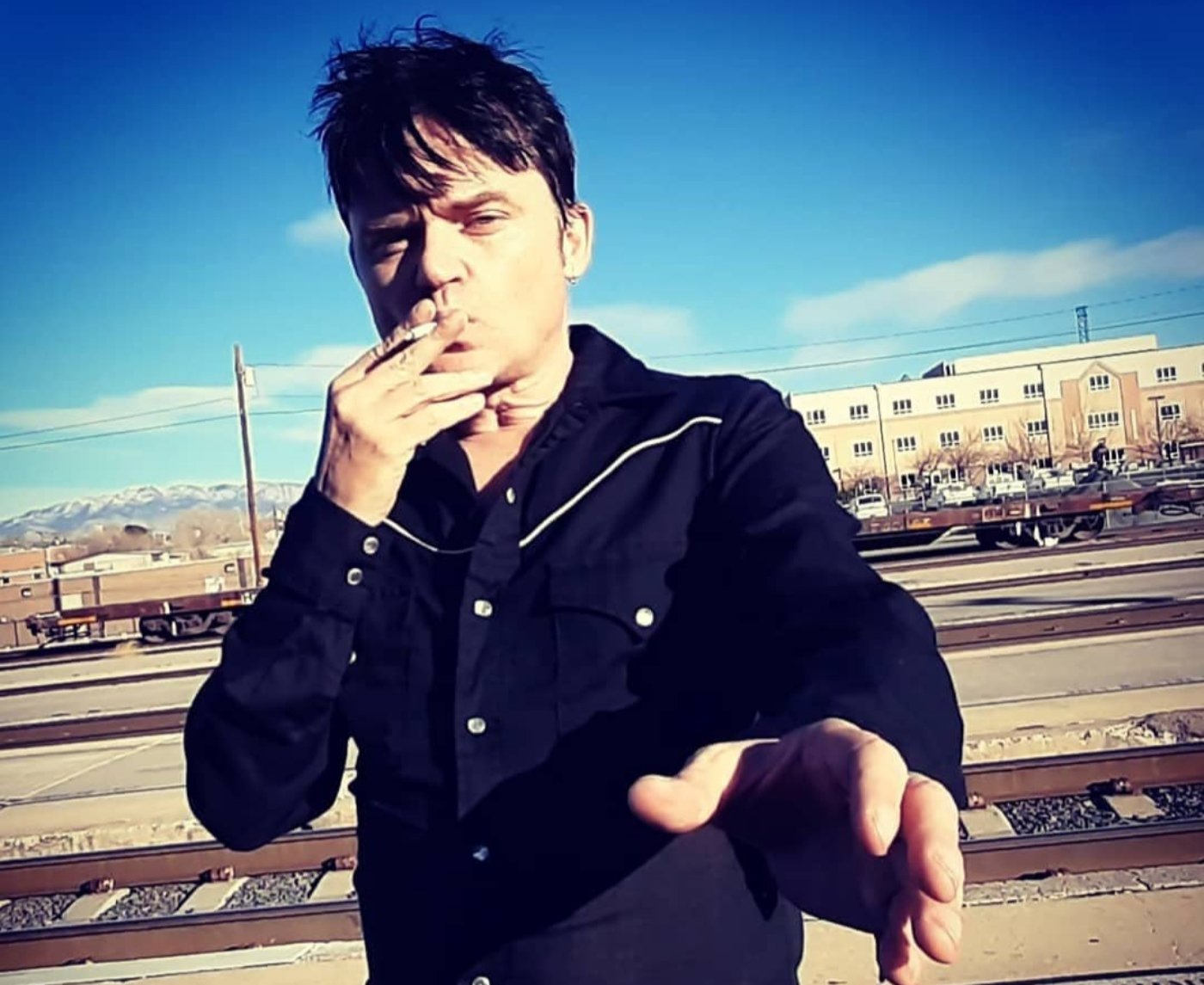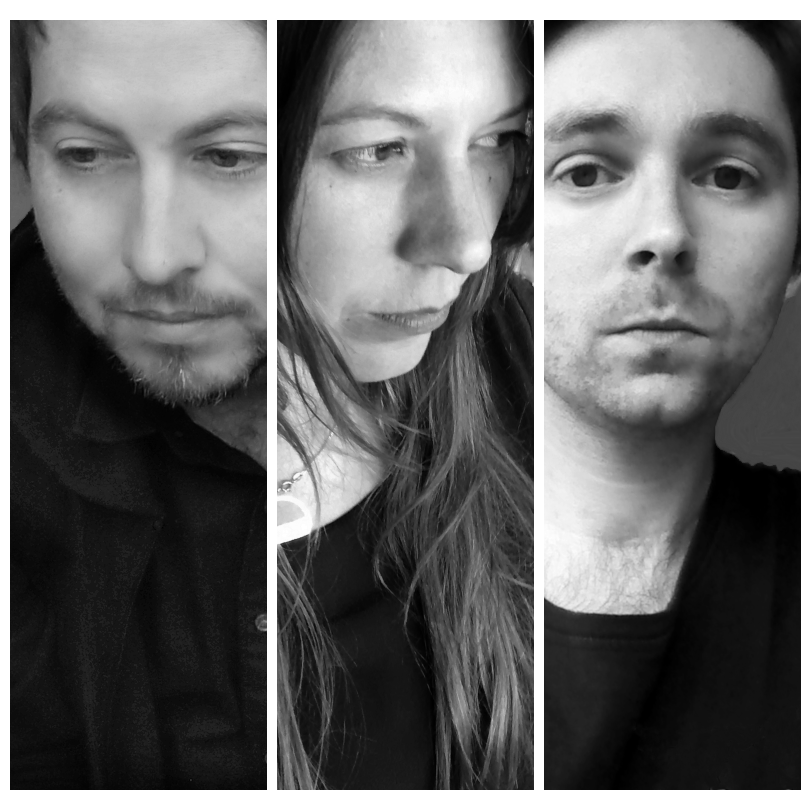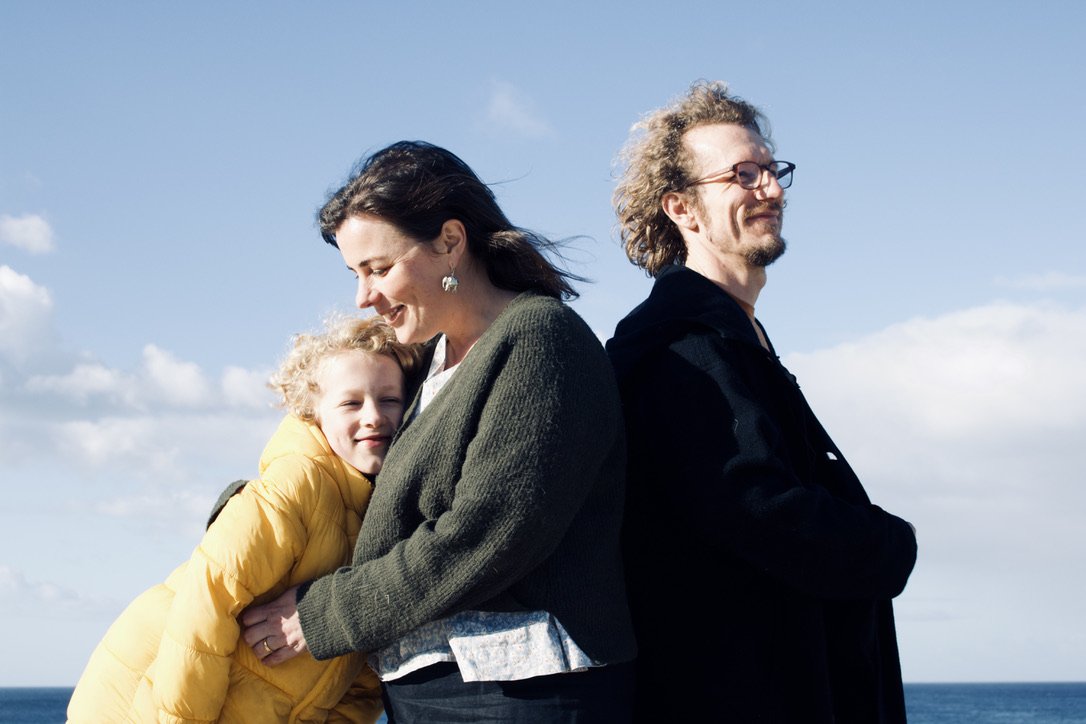Brandon De La Cruz: Interview + New Album 'Visions of Ovid'
KATIE BROWN - 22 MAR 2021
PHOTO SUPPLIED
Visions of Ovid is the relevant and quietly moving new album by New Zealand-based Portland artist Brandon De La Cruz, released last Friday on the 19th of March. Begun by Brandon several years ago in Portland, Oregon, the gentle and intimate folk album is an eight-track journey through songs inspired by the mythological characters and stories in Ovid’s Metamorphoses. Stranded in New Zealand when an April flight back to the US was cancelled due to Covid-19 after he flew into the country in February 2020, Brandon found himself living between Auckland and Hamilton, and took the opportunity to finish up the album with the help of Wellington sound engineer Thomas Lambert of Sonorous Circle.
Stylistically, the simple, guitar-driven instrumentation creates the perfect platform to showcase Brandon’s soothingly eerie vocals, which call to mind such artists as Bright Eyes, Sufjan Stevens and Jackson C. Frank. The often bittersweet songs explore characters from different myths depicted in Metamorphoses, such as that of Tiresias, a seer who was transformed from a man into a woman and back into a man by a pair of mating snakes Tiresias had separated for no good reason, and of Galanthis, of whom in “Birth of Hercules” Brandon sings, “I had a friend, a quick witted girl / with long red gold hair / low born but dear to me / she was there when I needed her there,” referring to the tale of the birth of Hercules, where Hercules’ mother was held back from birthing her child by the goddess Lucina and was rescued by her servant girl, Galanthis, who tricked Lucina into breaking her spell. Nearly all of the tracks similarly represent such stories.
Such mythological tales as these Brandon sings about are often very fantastical, and it is easy to look upon them as mere “once upon a time” stories. But when they came into being, they were the stories by which society made sense of existence: through Metamorphoses Ovid wrote what he considered to be the history of the world up until the deification of Julius Caesar, and certainly throughout the ages philosophers, psychologists, artists, theologians, poets and musicians have all referred back to them time and time again as touchstones that hold essential truths of the mysteries of life. In considering their relevance personally, Brandon says, “I think we all instinctually mythologize and are always in the process of creating a personal as well as shared mythology. For me that process often involves picking up and continuing with threads our ancestors left for us and making my own sense of them.” When you study these myths a little more deeply, you realise that there are many aspects of them that are startlingly and unexpectedly relevant to life today.
Complementing this view of the personal application of mythology, one of the things that struck me about the album was the track “Richard Serra Band”. Unlike the rest of the songs, bar one short instrumental named “Revival”, the track is not named after a mythical character or story. Exploring this anomaly a little further revealed a 2006 work entitled ‘Band’ by the contemporary American artist Richard Serra: the piece is a huge, curving, twisting wall of weathered steel that varies in shape and incline as the viewer walks through and around it. Serra’s desire was that it would be seen as something that “shapes space” while moving through it; in other words, that in interacting with it the viewer would let it define the space that they were seeing, and consequently themselves within it. To me, this is the perfect illustration of what Brandon does with Visions of Ovid: he takes these classical stories of mythical spirits, lets them shape what he sees externally, and adapts them internally to his lived experience, allowing them to colour how he views life.
That is where the magic of the body of work lies: on the surface, it’s a delicate and moving folk album with Dylan-esque touches, woven together with different threads of different tales with different outcomes. But delving a little deeper, it reflects Brandon’s deeply compassionate and empathetic consideration of humanity and its varying shades of experience, aligning with the especial power held within mythology. Though Visions of Ovid Brandon is able to take what might initially seem uncanny, fantastical and out-of-our-ken, and, acting like a portal between two worlds, introduce these ideas in a new way where we can reach out, touch and understand what might initially be incomprehensible to us. In today’s world, what could be more important?
You can catch Brandon De La Cruz live in Wellington on the 30th of April at the Home Alone house concert with Mali Mali. Email team@homealonemusic.co.nz to reserve a ticket.
Buy the album on Bandcamp and find streaming links here.
Read the May Magazine interview with Brandon and listen to the album below!
KATIE: TELL US A LITTLE ABOUT YOUR UPBRINGING: WHERE DID YOU GROW UP, AND WHAT ARE A COUPLE OF YOUR FAVOURITE MEMORIES?
Brandon: I was born and first raised in a suburb of Southeast Los Angeles called Whittier. When I was five we moved an hour further southeast to a new housing track in an isolated region between the cities of Corona and Lake Elsinore. My school was called Luiseño Elementary named after the indigenous group first there. Our house was a few hundred yards from a sprawling grapefruit grove. The smell of blooming citrus in the cold wind has stayed with me and likely influences my life in ways I don’t understand.
WHEN DID YOU START WRITING YOUR OWN SONGS? WHAT INFLUENCE DO YOU THINK THIS HAD ON THE WAY YOU WRITE?
I was 16 or 17 when I wrote my first song. It was very spontaneous. I had a notebook I was doodling and writing in and I turned something from there into a song. I think at that time I was feeling a lot of emotions having to do with family tensions, isolation and heartbreak. I discovered singing as a way to express and acknowledge that. Writing and singing in those moods and with that purpose has stayed with me. I think somehow song that comes through me wants to honor grief. I listen to a wide variety of music but through a lot of experimentation I’ve realized the songs that want to be sung by me are usually in a lamentful mode.
WHAT IS IT ABOUT MYTHOLOGY THAT PIQUES YOUR INTEREST AND DRAWS YOU TO WRITE ABOUT IT?
To me, mythology is the crossroads where my interests intersect. Poetry, religion, art, philosophy, psychology, anthropology and dreams all funnel back to the personal through mythology. I think we all instinctually mythologize and are always in the process of creating a personal as well as shared mythology. For me that process often involves picking up and continuing with threads our ancestors left for us and making my own sense of them.
WHO IS YOUR FAVOURITE MYTHOLOGICAL CHARACTER?
One I’ve recently realized has resonated with me since I was a kid is the folk hero John Henry.
OVID’S ‘METAMORPHOSES’ TELLS THE HISTORY OF THE WORLD FROM ITS CREATION THROUGH TO THE DEIFICATION OF JULIUS CAESAR, AND OVID PLACES THIS HISTORY WITHIN A MYTHOLOGICAL FRAMEWORK. HOW DO YOU RELATE TO THIS WAY OF SEEING AND DESCRIBING LIFE?
These myths in Metamorphoses have been such a major touchstone for generations of artists and so we have all these interpretations and representations to reflect on to help make sense of what we may be experiencing now. Myth often uses historical figures and events to share its treasures and with language rich with archetypal images distinct from other kinds of storytelling and most similar to the stories our dreams tell. I’ve always had lots of strange dreams as well as uncanny waking experiences that are really challenging to make sense of and interpret. I’ve found that immersing myself in myth has been the most helpful way to make sense of my own hard-to-categorize experiences, inner and outer.
WHEN YOU’RE WRITING THESE SONGS THAT REPRESENT DIFFERENT SPIRITS, DO YOU FIND YOURSELF WRITING THEIR STORIES OR FINDING YOURSELF IN THEIR STORIES? HOW DOES THIS PLAY OUT FOR YOU?
Generally I place myself in the stories and try to write as if I’m living the experience. Through drafting and redrafting though they sometimes work out in third person or a mix of perspectives. I think a song is especially powerful when it does come through from the spirit’s lived voice because then when I sing it or someone is listening and singing along the spirit gets to sing through you and that activates something in the singer. Like when I sing Tiresias’ song I sing, “Now the ends of my hands have a feminine touch…” A part of my psyche knows I’m singing a song about this myth but another part doesn’t make that distinction and is making that declaration on my own behalf.
WHAT OTHER INSPIRATIONS DID YOU DRAW FROM WHILE WORKING ON THE ALBUM?
I looked at a lot of art. I’ve got folders on my computer full of images of drawings and paintings from across the centuries of the myths I focused on. One of my favorites is Titian’s Venus and Adonis and I have a story about it. I first came across it online and referenced it often. On my birthday at the end of 2019 I was at the Getty in LA with my brother and one of my friends. In the morning we drank psilocybin tea and I soon wondered off on my own for most of the day, spending a lot of time with a Cezanne there that I love and eventually journeying down into the bottom floor where I stared at a photo of a garden I felt was a window into my own heart. After a long day full of joy and revelation I wandered into a gallery, looked up and there was Titian’s Venus and Adonis in all its glory and wonder. I sat in front of it until the museum closed and I certainly took it with me when I left.
COVER ARTWORK FOR ‘VISIONS OF OVID’
WHO ARE YOU CURRENTLY LISTENING TO?
Right now I’m enjoying things ranging from Kiri Te Kanawa’s recordings of Puccini and Verdi to The Staple Singers to Madvillain to Cat Power, Chris Knox, Elvis and Arthur Russell. Frank Ocean and Julian Casablancas are two mainstays. I’ve been returning to Bob Dylan’s record from last year, especially the song ‘Key West’.
YOU’VE BEEN STRANDED IN NEW ZEALAND A LITTLE LONGER THAN ANTICIPATED DUE TO COVID. HOW HAVE YOU FOUND YOUR TIME HERE, AND WHAT HAVE YOU ENJOYED THE MOST?
It’s certainly been a journey. I’m grateful to have landed in a place that’s managed the pandemic so well. My friend’s family in Auckland took really good care of me during the first lockdown. Since August I’ve been living in Kirikiriroa with my partner who I met soon after my arrival. She’s done so much to help me feel at home here. I’ve been making friends in the community of artists around Never Project Space. Thomas Lambert in Wellington has been very generous with his talents. My favorite place to be in NZ is on the beach at Raglan. Last March I slept out there alone on the sand. The stars felt incredibly close, I watched them change dramatically over the course of the night.
WHAT’S BEEN THE MOST DIFFICULT?
I do miss home a lot and have found it hard to manage my worry for all that’s gone on over the last year. Probably like most people I find it difficult to fathom the scope of loss. I recently described the experience to a friend as like being in a storm shelter listening to a radio about your home being destroyed by tornados. It’s hard for it to really sink in when you’re not there living it.
WHAT DO YOU HOPE THE REMAINDER OF 2021 WILL BRING?
Healing and common ground. I also really want to meet my niece who was born in August back in California, hopefully before her first birthday.




![[Friday Feature] Valere: Interview & Review of Single/Video ‘Lily’s March’](https://images.squarespace-cdn.com/content/v1/60df978127837427ee475bb1/1712873492906-GFSK6SW4FJ2Z2STOJVAM/Valere+-+Photo+Credit+Hayden+Graham+%281%29.jpg)

![[Video Premiere] Sig Wilder & Friends: Video for ‘Texasman’ + Interview](https://images.squarespace-cdn.com/content/v1/60df978127837427ee475bb1/1699397388451-3GDFG0FOA5T5WPA33ANE/IMG_2393.JPG)


![[International] Jackson VanHorn Releases New EP ‘Liminal Music, Vol. 1’](https://images.squarespace-cdn.com/content/v1/60df978127837427ee475bb1/1695708847770-UF5H8G2X7N9Q9KF22TA5/Jackson+VanHorn+Liminal+Music+Vol+1.jpeg)

![[Friday Feature] Jazmine Mary: Interview + New Album ‘Dog’](https://images.squarespace-cdn.com/content/v1/60df978127837427ee475bb1/1686280012940-2OBAFHQ9HIJFIVNYE3CZ/JazmineMary_Album+image+no+text+-+Credit+-+Jim+Tannock.jpg)
![[Video Premiere] Emily Rice Releases New Single/Video ‘Warenoa’](https://images.squarespace-cdn.com/content/v1/60df978127837427ee475bb1/1685044212209-9X8UTD0I22FY3LAGKDHI/Press+Shot_+Photo+Credit%2C+Charles+Looker.jpg)


![[Australia] Benny Time: Interview + New Album ‘Benny and Friends’](https://images.squarespace-cdn.com/content/v1/60df978127837427ee475bb1/1653689671831-U73A00Y16B4PYUPIEY7X/Benny+Time+3596.jpg)









